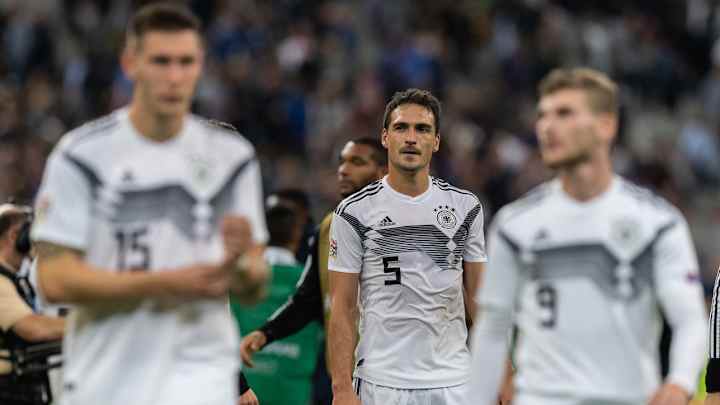Germany's Problems Under Low Only Grow After Poor World Cup

“Better late than never,” said German outlet Suddeutche Zeitung, after Germany’s Nations League game agianst France on Tuesday. Jogi Low had made five changes to his starting XI after Saturday’s 3-0 defeat to the Netherlands, bringing in Niklas Süle, Thilo Kehrer, Nico Schulz, Leroy Sane and Serge Gnabry, and so answering the calls for him to freshen up a side that has gone desperately stale of late. He also switched to a back three and was rewarded with what was probably Germany’s best performance this year. But his side still lost, blowing a first-half lead and succumbing to two Antoine Griezmann goals in a 2-1 defeat.
That’s three wins now in the past 13–and those came against Peru, Sweden and Saudi Arabia–the sort of run of poor form Germany hasn’t endured in for decades. And what is perhaps most worrying is that Germany, the team that famously could grind out results by force of will, is now losing when playing well. It led against France for 48 minutes, seemed comfortable and then suffered the sort of mental collapse it used into inflict on others. Confidence has gone, and when that happens there is usually only one outcome.
The game against the Dutch was similar. It wasn’t that Germany played especially badly; it dominated possession and had more shots than the Netherlands. But it played without any ruthlessness in front of goal, a lack of pace and belief, and it defended with a recklessly high line that the quick Dutch front three exploited ruthlessly.
Netherlands Now a Brighter Shade of Oranje After Missing Euros, World Cup
That has been the problem for the best part of a year, and Germany now faces the difficulty all top sides face when form begins to slide. But as is the case so often, the obvious surface issues mask deeper tensions–or, perhaps, a lack of morale brings tensions that would otherwise have remained hidden to the surface.
There seem to be two inter-related tensions. First, there is a generational divide. Low selected a youthful squad for the Confederations Cup in Russia in 2017. Germany won, playing superbly, but he then went back to old favorites for the World Cup, which seemingly caused some resentment among younger players wondering why they were being overlooked for, as they saw it, out-of-form veterans.
More worryingly, there were persistent rumors at the World Cup about a split between a corner of players who came through at Bayern–Manuel Neuer, Mats Hummels, Thomas Müller and Toni Kroos–and the so-called “bling bling gang” of Mesut Ozil, Sami Khedira, Jerome Boateng and Julian Draxler. Ozil’s retirement from international football and tone-deaf comments from various teammates about the difficulties he faces as a German of Turkish descent have served to perpetuate that notion.
Sane remains a mystery. It's true he has not been quite at his best for Manchester City this season, but there is still a bizarre disparity between his form for club and country, which is why he was left out of the World Cup squad. He has become, in a sense, a totem for Low’s struggles to rejuvenate his squad.
And then there are tactical issues. Low’s best side, oddly, was probably not the one that won the World Cup but the team that lost to Spain in the semifinal in 2010. It defended well and had a clearly defined counterattacking template that ruthlessly dealt with both England and Argentina.
Jadon Sancho Breaks the Mold for Young English Talent With Dortmund Success
The side of 2014, although it was just as ruthless in dismembering a hysterical Brazil in the semifinal, was rather less well-balanced. Low had begun the tournament trying to press and play on the front foot, which led to serious difficulties against both Ghana and Algeria. Only after the return of Miroslav Klose and the re-adoption of a less proactive approach did Germany produce that performances that won the tournament. Getting that balance right has eluded Low ever since.
At the World Cup, the two central defenders were again and again left exposed, a point Boateng made publicly. The center back was widely blamed for Saturday’s embarrassment against the Dutch, and he did not play well, but then defenders often lose form when they have no support. Low continues to seek to be a proactive pressing side, and the result is one clean sheet in 12 games.
And so Germany now, unthinkably, faces relegation from the Nations League. The reality is that such situations are only ever resolved one way, but the longer a manager is in a job, the harder it tends to be to remove him from it. There is no obvious replacement waiting to take over, but the decision to keep Low on after the embarrassment of a first first-round exit in the World Cup in 80 years is looking increasingly misguided.

An accomplished author of multiple books, Jonathan Wilson is one of the world’s preeminent minds on soccer tactics and history.